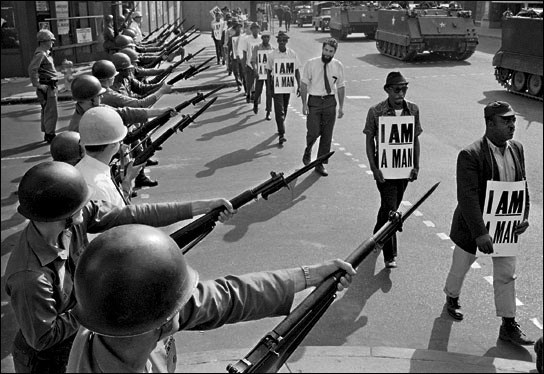I Am a Man
March 2018
“All labor has dignity.”
Martin Luther King, Jr., March 18, 1968, Memphis, Tennessee
Forty percent of the 1,300 sanitation workers who were part of AFSCME Local 1733 in Memphis received welfare benefits despite working sixty hours each week. When Dr. Martin Luther King spoke to these men, he told them, “you are reminding, not only Memphis, but you are reminding the nation that it is a crime for people to live in this rich nation and receive starvation wages.”
The Memphis sanitation workers went out on strike on February 12, 1968. Memphis Mayor Henry Loeb claimed the strike was illegal but said his office was willing to talk. However, when an AFSCME official met with him the next day, he said he would hire new workers unless the strikers returned to their jobs.
By Valentine’s Day, the newspapers reported more than 10,000 tons of garbage piled up. On February 23, police attacked strikers during a march with mace. A few days later, daily marches began. By March 9, the National Guard had begun holding riot drills. On March 18, Dr. King gave a speech to a rally of 10,000 where he told the crowd, “all labor has dignity.” That was also the speech where he made the declaration quoted above against starvation wages.
Ten days later, after a snowstorm prevented him from returning earlier, Dr. King led a march that erupted into violence. A 16-year old boy was shot and killed, and police used nightsticks, mace, tear gas and gunfire on the crowd. Sixty were injured as 4,000 National Guardsmen moved in and a 7 pm curfew was declared, to be in effect until April 1.
Dr. King canceled a trip to Africa to journey back to Memphis again. He gave his final, prophetic Mountaintop speech on April 3, where he seemed to predict his own assassination, but urged his supporters to keep fighting for justice.
These workers were fighting for basic human dignity. Dr. King walked with them, asking Memphis elected leaders to afford them simple respect as fellow humans. The response, from Memphis and from police and the National Guard, was brutally violent.
The men striking addressed the racial aspect of their treatment almost from day one. The NAACP sent representatives to speak to the strikers. The mostly white local media was sympathetic—to the blight on the city from uncollected trash, not for those striking due to literal poverty wages.
The strike is considered a major milestone in the civil rights movement, not just because it proved to be King’s final campaign, but also because “I am a man” went on to become a unifying civil rights theme. The slogan directly attacked the racist, infantilizing practice of white people referring to adult black men as “boy,” which prevailed for decades across the Jim Crow south.
After King’s murder on April 4 drew the eyes of the world to his city, the Memphis Mayor still refused to budge, even under escalating pressure to avoid further violence. United States President Lyndon Johnson sent federal troops, and a representative to try to mediate a solution. On April 8, 42,000 people took part in a completely silent march, led by King’s widow Coretta Scott King and other prominent national figures.
Finally, the strike ended in victory on April 16. Local business leaders had grown tired of the boycotts and marches. National and international scrutiny was not going away. The righteous determination of the strikers and the numbers of their supporters only grew. The sanitation workers won their union, with a 10 cent per hour raise on May 1 and five cents more in September. The Memphis City Council recognized the agreement and the workers unanimously approved it. At enormous cost, their dignity as persons and the worth of their labor had at last been affirmed.
This is the eighth in our series of posts about Martin Luther King, Jr., to mark the 50th anniversary of his assassination in Memphis, Tennessee, on April 4, 1968.
Read the seventh installment here.
Our next post will examine King's final speech in more depth.

